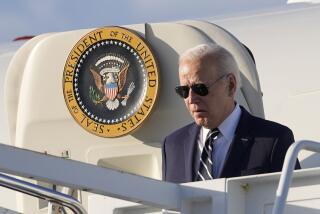Hillary Clinton makes case for Iran deal, and a more hawkish approach in Middle East
Hillary Rodham Clinton made a forceful case for moving forward with the Iranian nuclear agreement, laying out a plan Wednesday for backstopping it by bolstering American military and diplomatic influence in the region.
In a speech at the Brookings Institution in Washington, Clinton tried both to navigate the politically tricky territory and to highlight her deep foreign policy experience. She sought to assuage the deep concerns of Israel’s supporters, whose money and votes she needs for her presidential bid, with an accord that she said is the world’s best hope to stop Iran from obtaining a nuclear bomb.
“Either we move forward on the path of diplomacy and seize this chance to block Iran’s path to a nuclear weapon or we turn down a more dangerous path leading to a far less certain and riskier future,” Clinton said.
But Clinton also made clear that “there is absolutely no reason to trust Iran,” as she offered a notably hawkish strategy for pressuring the Tehran regime to abide by the agreement, shoring up Israeli security and thwarting the alliances Iran has with terrorist organizations.
The promises of a tough approach echoes much of what is being said by other Democrats eager to deflect criticism that they are being played by Iran. Some, including Clinton, have even suggested that the U.S. give Israel access to more powerful weapons. She did not go as far as Rep. Adam Schiff (D-Burbank), who has said Israel should be given bunker-busting bombs that would allow the country to destroy Iran’s enrichment facility without U.S. cooperation.
The tough talk has its own risks, with promises of standing up to Iran threatening to draw the U.S. more directly into regional conflicts. It also could push Iran to walk away from the deal.
Under the landmark deal reached in July, Iran agrees to limit its nuclear program in exchange for the U.S. and five other world powers lifting sanctions that have crippled Iran’s economy.
NEWSLETTER: Get the day’s top headlines from Times Editor Davan Maharaj >>
Clinton warned in her speech that the agreement, while imperfect, at the very least buys Israel and its allies precious time. Under the agreement, she said, it would take Iran at least a year to obtain a nuclear weapon should it walk away from the agreement to pursue that path. Without the deal in place, she said, Iran could obtain a weapon within a couple of months.
“If we were to reject this agreement, Iran would be poised to get everything it wants without giving up a thing,” she said. “Those of us who have been out there on the diplomatic front lines know that diplomacy is not the pursuit of perfection. It is the balance of risk.”
Some in Congress as well as Republican presidential candidates have spoken of rejecting the deal to return to the negotiating table, talk that Clinton called reckless. GOP front-runner Donald Trump and Texas Sen. Ted Cruz, who’s also seeking the party’s nomination for president, were to headline a rally later Wednesday outside the Capitol in Washington to protest the deal as Congress debates whether to pass a resolution disapproving it.
“Great powers can’t just junk agreements and expect the rest of the world to go along with us,” she said. “We need to be reasonable and consistent, and we need to keep our word.”
Clinton talked extensively about how the issue is not just about policy for her, but it is also personal. It represents the culmination, she said, of an effort that started when she was secretary of State and helped organize international sanctions against Iran.
“I traveled the world capital by capital, leader by leader, twisting the arms that helped build the global coalition,” she said. “American sanctions provided the foundation but Iran didn’t really feel the heat until we turned this into an international campaign.”
Then she talked about meeting with the sultan of Oman to put in motion the secret back-channel discussions that would evolve into the talks that produced the nuclear deal.
Clinton was adamant about what the deal is and is not.
“This is not the start of some larger diplomatic opening,” she said. She warned that Iran will try to cheat, to wait out the U.S. so it can find an opening to again ramp up its nuclear operation, and may use some of the economic relief from the lifting of sanctions to provide renewed support to terrorists.
“The success of this deal has a lot to do with how the next president grapples with these challenges,” she said. “My starting point will be one of distrust. ... We should anticipate that Iran will test the next president. They will wan to see how far they can bend the rules. That will not work if I am in the White House.”
Clinton said that should things fall apart to the point where military force becomes necessary, she would not hesitate to use it.
She presented a five-point plan for dealing with Iran beyond the nuclear deal. It calls for boosting military ties with Israel, including increased support for its rocket and missile defenses, as well as an expanded U.S. military presence in the Persian Gulf, geared toward helping allies bolster their defenses against attacks from Iran and its proxies.
“Israel has every reason to be alarmed by a regime that both denies its existence and seeks its destruction,” Clinton said. “I know my saying this deal makes you safer won’t alleviate the very real fear of the Israeli people.”
But she emphasized that Israeli security for her is a personal issue, and that the situation creates an opportunity for the U.S. and Israel to strengthen their alliance and bolster Israeli security.
To underscore the point, she vowed to invite the Israeli prime minister to the White House within her first month in office to work on plans for moving forward.
“We have honest disagreements about this deal,” Clinton said. “Now is the time to come together. ... I know well that the same forces that threaten Israel threaten the United States. You never have to question whether we are with you. The United States will always will be with you.”
Clinton said she also respects the skepticism of the deal expressed by key congressional Democrats such as Sen. Charles Schumer of New York.
“I have a harder time respecting those who approach an issue as serious as this with unserious talk,” she said. “Especially anyone running to be president.” She warned the boasting by some GOP candidates that they would walk away from the agreement soon after taking office is dangerous.
“That’s not leadership,” Clinton said. “That’s recklessness. It would set us right down the very dangerous path we have worked so hard to avoid.”
Twitter: @evanhalper
More to Read
Get the L.A. Times Politics newsletter
Deeply reported insights into legislation, politics and policy from Sacramento, Washington and beyond. In your inbox three times per week.
You may occasionally receive promotional content from the Los Angeles Times.







